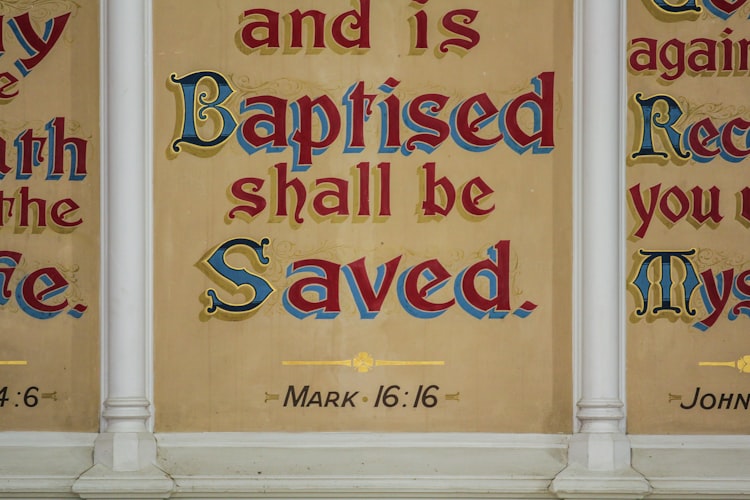Ezekiel 4—7: Idolatry Matters Because It Hurts People
Ezekiel 4—7 begins the in-earnest doom-and-gloom chapters of Ezekiel's oracles against Israel and Judah. Our morning Bible study read through these verses, and I'll tell you, they are rough going. There are certainly conversations to be had about the violence, famine, cannibalism, and warfare all attributed to God.
But what I particularly want to focus on is the song(s) in chapter 7. Listen to the reasons why God feels the need to punish Judah:
Violence: Their violence has grown into a rod
that will beat them for their wickedness.
[AP: what a hilarious image]
The land is bloodied by terrible crimes.
Jerusalem is filled with violence.
I will bring on them the evil they have done to others,
and they will receive the punishment they so richly deserve.
Economics: All their wealth and prestige will be swept away.
Buyers should not rejoice over bargains,
nor sellers grieve over losses,
Even if the merchants survive,
they will never return to their business.
They will throw their money in the streets,
tossing it out like worthless trash.
Their silver and gold won’t save them
It will neither satisfy nor feed them,
for their greed can only trip them up.
They were proud of their beautiful jewelry
and used it to make detestable idols and vile images.
Therefore, I will make all their wealth disgusting to them.
The preaching I've heard on the message of prophets can focus solely on the sin of idolatry. Because Israel-Judah refused to worship God alone, God was forced to punish them. Therefore, the preaching goes, as Christians, we too must avoid idols. Of course, modern folks tend not to have literal idols they bow down to, so preachers are forced to come up with contemporary examples. I did a quick search on Sermon Central on what examples of idolatry preachers are using. Here's what I found:
- Not using the standard hymnbook liturgy and singing new music instead;
- President Bush meeting with Japanese leaders in a Japanese shrine;
- TV shows containing witches and warlocks;
- Wearing a rainbow on a sports uniform;
I know, big sigh.
What we need to understand, though, is that in the prophetic imagination, idolatry wasn't evil solely because it was idolatry. Idolatry was evil because of what it led to. And what it led to, without fail, was: economic injustice, violence, and oppression against marginalized people (often women, children, and immigrants; what Scripture calls "widows, orphans, and strangers").
Idolatry wasn't evil solely because it was idolatry. Idolatry was evil because of what it led to. And what it led to, without fail, was: economic injustice, violence, and oppression against marginalized people.
The prophet Amos was, perhaps, the most vocal against the evil of greed and economic violence. For Amos (see chapter 4), more important than proper ritual, sacrifice, or worship was economic justice.
But Ezekiel picks up these themes as well. That's why it's important not to read the prophecies of doom and destruction as God merely throwing a jealous hissy fit because people are worshipping gods other than Him. No, God is acting in vengeance on behalf of the poor and the shoved-aside. Any act of idolatry is, in fact, an act against the vulnerable that God swore to protect.
Any act of idolatry is an act against the vulnerable that God swore to protect.
This doesn't make the horrible violence any easier to swallow. But it can at least make the motives behind the prophesied violence easier to understand. It can also help us understand why Ezekiel could be understood as "good news" to someone hearing it for the first time 2,600 years ago; or how it could be read as good news even today—if you take on the perspective of a poor or marginalized person. "You mean the jackasses who steal my money and children to build exorbitant shrines to gods we can't see are finally going to be punished? Praise the Lord!"
There's a message for the American church in these oracles as well. I can imagine a modern Ezekiel preaching the Lord's destruction on churches that made an idol out of growth; that protect institutions instead of the women or children that they abuse; that ostracize LGBTQI+ people; that refuse to acknowledge racism, antisemitism, and antiBlackness.
Preachers today, then, don't need to sound so silly when formulating contemporary examples of idolatry. We can use the same ones that Ezekiel used. Why is America's homeless rate so high? Why is our military spending so much more than the rest of the world? Why do we have more guns and gun violence than any other rich nation? Why are certain races of people more likely to be born poor and die poor? It's called idolatry, baby.
Ezekiel's message to the white American evangelical church could be much the same as it was to the religious institutions of his day:
I will bring on them the evil they have done to others,
and they will receive the punishment they so richly deserve (Ezekiel 7:27)



Member discussion